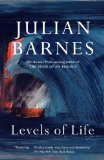Reading Guide Questions

Please be aware that this discussion guide will contain spoilers!
Reading Group Discussion Questions for Levels of Life by Julian Barnes.
- Julian Barnes begins the book with a striking assertion: "You put together two things that have not been put together before. And the world is changed" [p. 3]. How are the seemingly disparate concerns of Levels of Life - love and grief, ballooning and photography, height and depth - brought together? In what ways are these themes connected? In what ways is the book itself an unprecedented act of joining, even as it is about loss and separation?
- What is the effect of placing his essay on grief after the section on the history of balloon flight and aerial photography, and the fictionalized account of the love affair between Fred Burnaby and Sarah Bernhardt? Would the final section have been less affecting if Barnes had published it as a stand-alone piece?
- Why does Barnes come to love opera - an art form he had formerly despised as overly dramatic - after his wife dies? What is it about opera that elicits such a powerful emotional response form him? Why does he call it his "new social realism" [p. 100]?
- Discuss the implications of Barnes's remarkable assertion that we seek out love, in spite its potential for grief, because "love is the meeting point between truth and magic. Truth, as in photography; magic, as in ballooning" [p. 39]. Why should the joining of truth and magic be so potent?
- What did balloon flight represent to its first proponents, the "balloonatics"? What kind of freedom did it offer them? Why did some people feel that it in fact constituted a kind of hubris?
- Why does Barnes assert that "we are bad at dealing with death, that banal, unique thing; we can no longer make it part of a wider pattern" [p. 75]? Why is this the case? What shared patterns, beliefs, and myths have we lost that might allow us to experience death in more meaningful ways?
- What is Barnes suggesting when he writes that "the fact that someone is dead may mean that they are not alive, but doesn't mean that they do not exist"? [p. 111].
- Why does Barnes object so strongly to euphemisms like "passed" and "lost to cancer"? How does he react to the well-meaning and largely conventional consolation offered by friends - that he should get away for a while, or meet someone new, or that surviving grief will make him stronger?
- Bewildered by his grief, Barnes asks: "What is 'success' in mourning? Does it lie in remembering or in forgetting? A staying still or a moving on? Or some combination of both? The ability to hold the lost love powerfully in mind, remembering without distorting? The ability to continue living as she would have wanted you to... ? And afterwards? What happens to the heart - what does it need, and seek?" [p. 122]. How might these questions be answered?
- Compared to most memoirists, Barnes is remarkably restrained about his wife, never mentioning her name or the cause of her death. Why might have he have made this choice? What is the effect of focusing so intensely on the experience and meaning of his grief rather than its source?
- How does Barnes argue himself out of suicide? How does he justify continuing to talk to his wife after she dies? In what ways is his thinking on these questions both exceptional and perfectly logical?
- Barnes gives readers an extraordinarily nuanced and searching meditation on grief. What are some of the most remarkable insights he offers in Levels of Life?
Unless otherwise stated, this discussion guide is reprinted with the permission of Vintage.
Any page references refer to a USA edition of the book, usually the trade paperback version, and may vary in other editions.

 Book Reviewed by:
Book Reviewed by:



